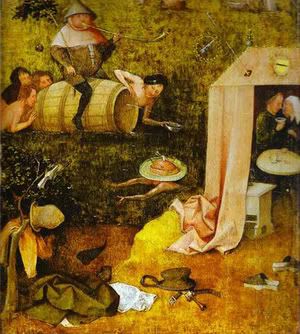Doing Wrong Willingly
 Socrates is famous for the maxim that, "No one does wrong willingly". To our modern ears, this sounds incredibly strange. However, Socrates is not making a claim that is somehow simply anachronistic. His own contemporaries, such as Meno, believed that this claim was equally strange. Socrates is making a claim in some ways similar to a view held by rational psychological determinists, which I have written on here. This is the claim that we always do what we think is best, and we are never overcome by our desires. Aristotle finds this claim compelling, but ultimately disagrees with Socrates. I will explain the import of their dispute, and how Aristotle seeks to resolve the question.
Socrates is famous for the maxim that, "No one does wrong willingly". To our modern ears, this sounds incredibly strange. However, Socrates is not making a claim that is somehow simply anachronistic. His own contemporaries, such as Meno, believed that this claim was equally strange. Socrates is making a claim in some ways similar to a view held by rational psychological determinists, which I have written on here. This is the claim that we always do what we think is best, and we are never overcome by our desires. Aristotle finds this claim compelling, but ultimately disagrees with Socrates. I will explain the import of their dispute, and how Aristotle seeks to resolve the question.Socrates' claim sounds strange to modern ears. Normally, we believe that we act according to our strongest desire, not our beliefs about what is best. It is the moderns, however, who have this wrong. Imagine our normal beliefs about lack of self-control were correct. I would believe that it is better to not smoke a cigarette. However, somehow, despite this belief, my desire would grab hold of my body, take out the cigarette, stick it in my mouth, light it and puff on it, all while my reason looks on in horror, powerless to stop my desires from moving my body around. Socrates and Aristotle both believed that behaviour like this would be dissociative. If our desire could really move our bodies around without our reason's consent, we would have the experience of watching our body be literally pushed around by desires over which we have no control. Rather, the problem is not to explain how our reason does what it thinks best without necessarily desiring it (such as in the modern problem of altruism), but to explain how we could be moved by our desires at all.
Socrates was willing to bite the bullet on this one. He believed that all vice was really a form of ignorance. If people knew what was really best, they would necessarily do it. There would be quite literally nothing that could stop them. Desire cannot move the body without reason's consent, while reason can move the body directly. Instead, people would be mistaken about the value of bodily pleasures relative to intellectual pleasures, and these mistakes would make them do things they believed were best, but are really not. As such, people who act wickedly should be taught, if possible, to act better.
Aristotle thought this had to be incorrect. He believed that the experience of loss of self-control was simply a datum of everyday life and needed to be explained, not justified. However, he wanted by-and-large to keep Socrates' position that a properly functioning reason could not be trumped by desire (though he does acknowledge that on very rare cases desire can simply grab control of the body in a dissociative way; I believe he is thinking of extreme cases here like panic in battle). Instead, what he argued was that desire, since it cannot compete with a properly functioning reason, dulls reason in the same way that alcohol dulls reason. He compares the person lacking self-control to a drunk quoting Empedocles; the drunk seems rational, but he is not. Desire, unable to compete with a properly functioning reason, liquors reason up, so to speak, and takes control while reason gazes into its cups. In this way, he tries to agree with Socrates belief that we never knowingly do wrong while accounting for the datum of loss of self-control.
Socrates and Aristotle approach the question of doing wrong willingly quite differently than moderns. There is not an independent will nor do our desires move us. Rather, the difficulty they wished to explain is how our desires could possibly move us at all. Socrates believed they couldn't and Aristotle believed they could, but neither of them believed that desires could move us despite a fully functioning reason.









1 Comments:
This is an outstanding comment.
I read Plato years ago. I intend to revive my study of this important writer by setting aside some time each month.
Many of the philosophical opinions I get razzed for are simply restatements of Plato, but I'm too ill-educated to cite my source properly.
Thanks for giving me a starting point for citation.
r
Post a Comment
<< Home